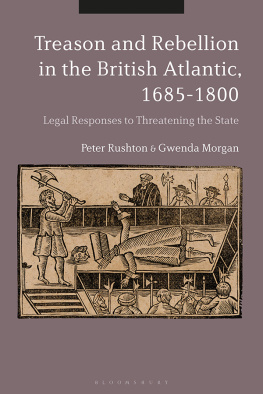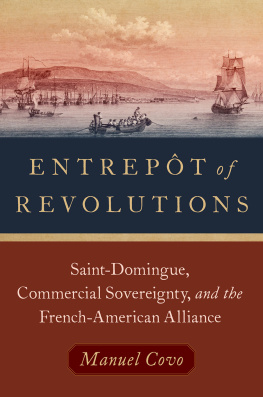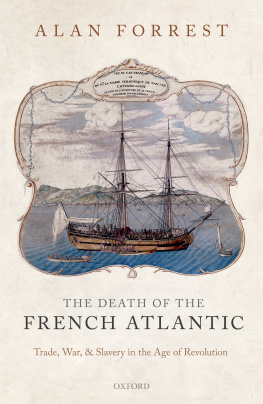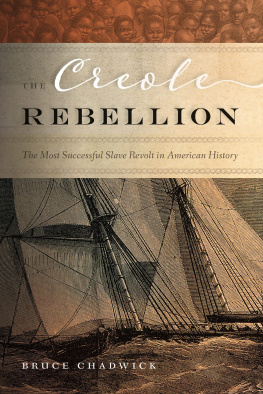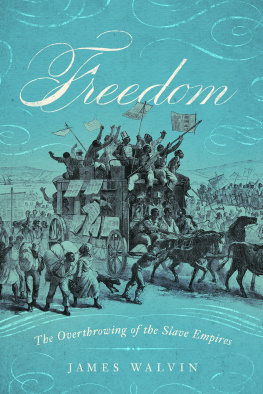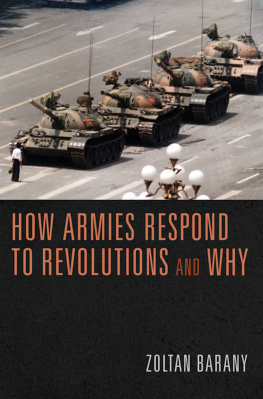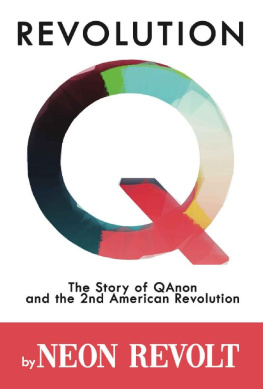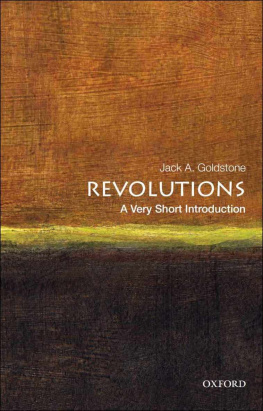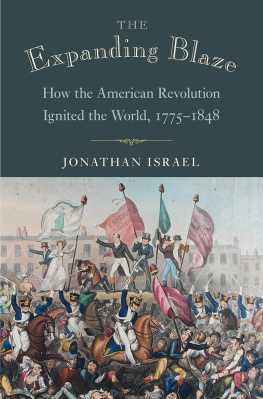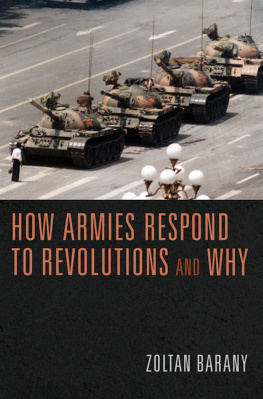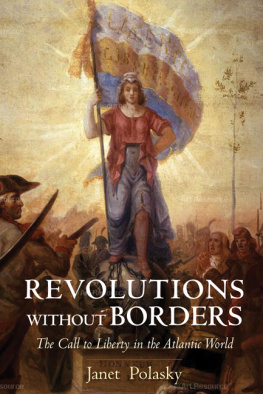Revolutions in the Atlantic World
Revolutions in the Atlantic World
A Comparative History
New Edition
Wim Klooster

NEW YORK UNIVERSITY PRESS
New York
NEW YORK UNIVERSITY PRESS
New York
www.nyupress.org
2018 by New York University
All rights reserved
References to Internet websites (URLs) were accurate at the time of writing. Neither the author nor New York University Press is responsible for URLs that may have expired or changed since the manuscript was prepared.
Library of Congress Cataloging-in-Publication Data
Names: Klooster, Wim, author.
Title: Revolutions in the Atlantic world : a comparative history / Wim Klooster.
Description: New edition. | New York : New York University Press, 2017. |
Includes bibliographical references and index.
Identifiers: LCCN 2017008033| ISBN 9781479875955 (cloth : acid-free paper) |
ISBN 9781479857173 (paperback : acid-free paper)
Subjects: LCSH: RevolutionsAmericaHistory18th century. | RevolutionsAmericaHistory19th century. | RevolutionsCross-cultural studies. | SovereigntyCross-cultural studies. | United StatesHistoryRevolution, 17751783. | FranceHistoryRevolution, 17891799. | HaitiHistoryRevolution, 17911804. | Latin AmericaHistoryWars of Independence, 18061830.
Classification: LCC E18.82 .K55 2017 | DDC 973.3dc23
LC record available at https://lccn.loc.gov/2017008033
New York University Press books are printed on acid-free paper, and their binding materials are chosen for strength and durability. We strive to use environmentally responsible suppliers and materials to the greatest extent possible in publishing our books.
Manufactured in the United States of America
10 9 8 7 6 5 4 3 2 1
Also available as an ebook
Contents
When I first arrived in the United States on a Fulbright fellowship in 1995, the John Carter Brown Library in Providence, Rhode Island, was my new academic home. An unrivaled repository of books published on the Americas from Columbuss days to those of Bolvar, the JCB also offered a superb environment for intellectual exchange with fellow Americanists and Atlanticists. It was therefore no punishment to return to Providence during the academic year 20062007 on a Mellon InterAmericas fellowship. I would like to thank Director and Librarian Ted Widmer and his staff for providing all the conditions in which scholarship can thrive. Most of this book was written at the library, upstairs and downstairs, inspired by conversations with other scholars using the collection. Particularly stimulating were the discussions I had with Guillaume Aubert and Lyman Johnson, experts respectively on French and Spanish America. Outside of Providence, Mark Peterson and one of the manuscripts anonymous reviewers helped me tremendously with their comments and insights. Last but not least, I have benefited from the support of Aviva Ben-Ur, Alison Games, and Philip Morgan.
This book also bears the imprint of Clark University, where I teach a seminar every other year on the Age of Atlantic Revolutions. Different cohorts of students have thus contributed to my ideas about the individual revolutions and their connections. I am grateful as well to my colleague Thomas Khne for inviting me to speak about the revolutions in our departments colloquium, which offered plenty of food for thought. Finally, my thanks to Debbie Gershenowitz, the history editor at NYU Press and herself a Clark alumna, for approaching me about this book project and then shepherding it through the publication process.
Introduction
Empires at War
On July 11, 1791, an elaborate spectacle unfolded in revolutionary Paris. On a triumphal car twenty-five feet high, the remains of the great philosophe Voltaire (16941778) were carried around the city. One hundred thousand residents defied the pouring rain to witness the procession, many of them dressed in classical outfits in front of,
The cortege also halted at the ruins of the Bastille. As a major symbol of arbitrary rule, this old royal prison had been the target of an angry crowd just two years before. The storming of the Bastille Although each uprising (or set of uprisings) had its own causes, traits, and impact, they all created sovereign states that professed hostility to privilege and began to question black slavery. Between the first shots fired in Lexington and Concord in 1775 and the departure of the last Spanish troops from mainland America in 1826, these revolutions changed the Atlantic world beyond recognition.
ideas was in the various revolutions. What is clear is that they shared an ideological background: the Enlightenment.
The author of an entry in the Encyclopdie, the famous eighteenth-century work that was aimed at incorporating all existing knowledge, painted a contrasting picture of two kinds of thinkers. Some men are carried away by their passions, without their actions being preceded including science, economics, philosophy, theater, and politics.
By rationally penetrating, ordering, and controlling the world, educated people who embraced Enlightenment thought worked to increase the happiness of mankind through material advancement. for that. The production of its written works and the correspondence between its protagonists took place in what contemporaries called the Republic of Letters, a polity transcending borders whose ideas applied to the wider world.
No consensus was ever reached about many topics. The philosophes disagreed so often that we should actually conceive of the Enlightenment as a series of problems
The Enlightenment derived its dynamic in part from the massive reaction it brought about in conservative circles. A true Counter-Enlightenment came about, shaped by thinkers the educated part of the population. In Austria, Sweden, Denmark, Spain, Portugal, and Germanys Roman Catholic states, the enlightened minds were almost exclusively tied to the state.
Was the French Assembly right in claiming that their revolution had been the fruit of Voltaires work? The question whether Enlightenment thought was actually instrumental in bringing about the revolutionary
and corporatism. They did not inevitably cause the various revolutions, but they did give the insurgents an ideological reservoir that they could tap as they improvised to set up new forms of government.
The objective of this book is to present the four above-mentioned revolutions on their own terms, while emphasizing four aspects:
- 1. They cannot be understood outside the
- 2. None of the revolutions was foreordained. Even if active fault zones were visible, the political earthquakes could have been avoided until the very moment that they hit. Nor were the revolutions guaranteed success once they broke out. Loyalty to the empire was considerable in the American colonies, and it was only in the course of wars that the revolutions triumphed.
- 3. Divided loyalties meant that these wars often had the overtones of civil wars, whose main protagonists were previously voiceless popular classes fighting for their own reasons, which often did not square with those of the elites.
- prism through which to see these uprisings. It was hardly more than a temporary by-product of some insurrections.
Which social factors made the Atlantic world ripe for revolution? Although eighteenth-century Europe was undergoing rapid change, agriculture remained the livelihood of the majority. From time immemorial, clergy and nobility owned most land, which had given them access
A lasting medieval legacy was that landownership entailed not only economic power for the landlord, but judicial authority over the peasants living on his lands. The nobilitys principal privileges were different, however, consisting of the right to be judged by ones peers and exemption from some, though by no means all, taxes. Privilege was the organizing principle of the European kingdoms


